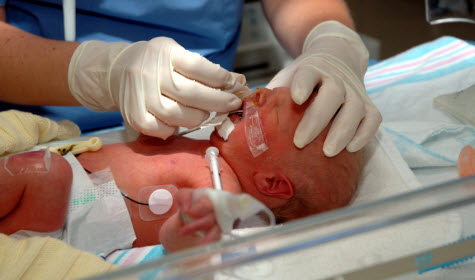
Neonatal nursing is a subspecialty within the field of nursing that involves the care of newborn infants. The infants for whom they care can range from healthy newborns to the most critically ill. While the term “neonatal” refers to the first 28 days of an infant’s life, neonatal nurses often end up treating infants well beyond 28 days.
Neonatal nurses generally treat infants who experience medical problems that present at or shortly after birth. These problems can include premature birth, infections, birth defects, cardiac malformations, and much more. Some of the problems can be long-term such as those resulting from prematurity which might require these nurses to care for those infants for up to two years. Neonatal nurses care for infants from birth until the time that they are discharged from the hospital.
Roles for Neonatal Nurses
There are four levels of infant care which can be provided by hospitals to infants. The four levels of neonatal care are defined as follows:
- Level I: Well newborn nursery
- Level II: Special care nursery
- Level III: Neonatal intensive care unit (NICU)
- Level IV: Regional NICU
Neonatal staff nurses are needed in all of the above settings. Nurses working in the higher level units are required to have much more knowledge and training in how to care for critically ill and premature newborns. They are in demand at children’s hospitals. They may also choose to work as part of a neonatal transport service team.
In addition to working as neonatal staff nurses, neonatal nurses can pursue careers in advanced practice nursing. They can become Neonatal Nurse Practitioners or Neonatal Clinical Nurse Specialists.
Neonatal Nursing Settings
Unlike most other nursing fields, neonatal nurses work almost exclusively in hospital settings. Most opportunities exist in labor and deliver departments, hospital nurseries, and the neonatal Intensive care units. There are some community opportunities for such nurses to provide home care to or to follow up on high-risk infants after being discharged.
Requirements for Becoming a Neonatal Nurse
Obviously, the first step to becoming a neonatal nurse is to become a licensed Registered Nurse (RN) for those just entering the nursing field. This can be done by obtaining a diploma, Associate’s degree, or Bachelor’s degree in nursing and then passing the NCLEX licensing examination. A Bachelor’s degree in nursing provides students seeking to become an RN with the greatest amount of flexibility in career options.
Students who hold a Bachelor’s degree in a non-nursing field can also enter the nursing field by completing an Accelerated Direct Entry MSN program which typically can be completed in 1-2 years of full-time study.
Those seeking to become advanced practice nurses specializing as Neonatal Nurse Practitioners or Neonatal Clinical Nurse Specialists will need to earn a Master’s degree in nursing or Doctor of Nursing Practice degree.
Neonatal Training & Certification
RNs who are interested in neonatal nursing should seek out hospitals which have a neonatal intensive care unit. Some hospitals will require nurses to have prior experience in caring for newborns (such as having worked in a Level I nursery or in a pediatrics department) in order to qualify for a position in their NICU. However, most hospitals offer in-house orientation programs to teach nurses seeking to become NICU staff nurses how to care for critically ill infants regardless of whether you are a recent graduate or have experience as an RN so long as you have a strong interest in working in a Neonatal Intensive Care Unit.
Nurses can also pursue certification as a Certified Critical Care Nurse (CCRN) in Neonatal Care through the American Association of Critical-Care Nurses.
